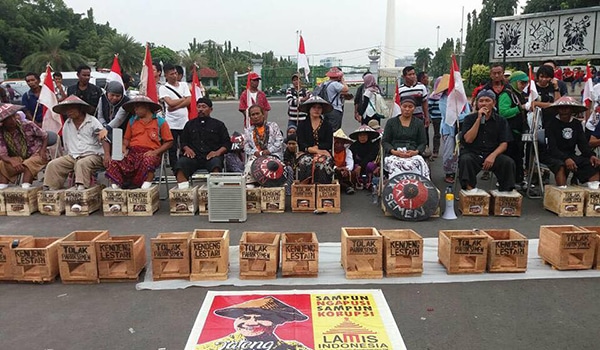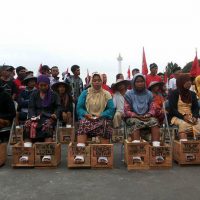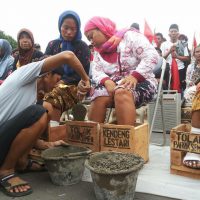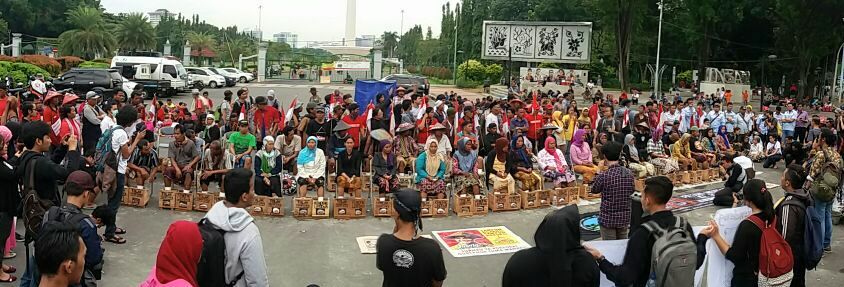Since March 13, 2017, over 50 local indigenous peasants known as Sedulur Kendeng have been sitting with their feet in cement boxes in protest. This is their second such protest in eleven months.
It is both a symbolic and literal plea to President Joko Widodo, more commonly known as Jokowi, to halt the construction of a cement factory in Rembang, Central Java. They are protesting against the planned mining operation of PT Semen Indonesia—a state owned enterprise. The mega-plan is supported by Ganjar Pranowo, the Central Governor of Java, and Rini Soemarno, the Minister of State-owned Enterprises. Both are politicians from PDIP (Indonesian Democratic Party of Struggle) who led Jokowi to his presidency back in 2014.
A week after, on March 22, Teten Masduki, the Head of Presidential Secretariat, invited the peasant-protester representatives to meet. Masduki said that there is no option for the President to single-handedly revoke the permit. He emphasized that the final decision has to be made by the governor himself. The unpleasant result was predicted by the peasants and their activist allies. They all went back to the YLBHI (Indonesian Legal Aid Institution) office, which has been turned into a protest camp, to discuss their next move and respond.
Disappointed with the answer, early on March 22, Patmi, one of the peasant-protesters, had a heart attack. Her death led to national outcry and solidarity. More than a dozen cities rose up in action where protesters also cemented their feet as sign of solidarity with the Kendeng peasants.
The Samins
Samin is the first name of Samin Surosentiko, a man from Randublatung, Blora born in 1859. His birth name was Kohar, and his father was Raden Surowijoyo, a petty prijaji (aristocrat) from Bojonegoro. From a young age, Samin had decided to become a peasant. He had six cows and one small rice paddy and another smaller piece of dry land for planting cassava, sweet potatoes, and vegetables. He had abandoned his prijaji privileges and changed his name from Kohar to Samin, a name he considered more populist. Beginning in 1890, Samin began broadcasting his teachings in Klopodhuwur. His popularity traveled to the next village, Tapelan. According to the Dutch colonial government, in January 1903, Samin had about 772 followers in 34 villages across Blora.
One of the most important values of Samin’s teachings is about land. For Samin and his followers, land is not property. As a source of food and life, Samin’s followers called land “mother.” It needs to be respected by protecting the environment and forbidding their members to sell land for profit. Being a peasant is more than a profession. For Samin and his followers, farming is another way of praying to God. That’s why the Samins only work as peasants. The Samin community also forbids its members to work as government officials. They believe that ruling others with power will bring imbalances within the community. No one is higher than others and one should respect another. Asking and giving help is what Samin’s followers believe. The Samins also forbid their members to be merchants. They strongly believe if one becomes a merchant, they would tell lies and bring misfortune into the community.
Initially, Samin and his followers did not catch the attention of the colonial police. But in 1905, they began to refuse paying taxes, which put them on the colonial government’s radar. Two years later, Samin had over 5,000 followers. In March 1907, there was a rumor about an uprising led by Samin. It led to mass beatings and arrests by the Dutch colonial police of Samin followers who attended the harvest celebration in Tuban Kedhung. As a reponse to the arrests, the followers inaugurated Samin as the Messiah. The inauguration worried the colonial government. They decided to take action. With the consent of the Dutch, Raden Pragola, district assistant officer in Randublatung, Blora, arrested the new Messiah, forty days after his inauguration. On December 18 of that year, Samin was sent to be locked in a former limestone mine. Later, along with his followers who were also arrested, Samin was taken to Rembang to be interrogated. The colonial government decided to send Samin to exile in Padang, West Sumatra, far away from his followers.
But Samin’s teachings did not fade away. His pupils continued to spread his ideas in the areas of Randublatung, Grobogan, and Kajen. As a sign of protest against colonialism, Samin’s followers refused to pay taxes. The colonial government kept arresting those who were actively spreading the messages. In 1908, Samin’s right hand Wongsorejo Djiwan was sent to exile as well. Samin died in exile in 1914. The Dutch colonial government spread negative propaganda about Samin and his teachings, and this propaganda continued up through the New Order regime. But as time went on, the black propaganda against Samin was defeated by his followers. The Samins, who call themselves Sedulur (which means “comrades”), continue to live independently and do not like being forced by any party.
Against Cement
The northern mountainous region of Kendeng is a karstic area spreading over the southern Pati district, north Grobogan, Rembang, Blora, Tuban, north Bojonegoro and west Lamongan. All these districts are located in Central Java, Indonesia. The Samins have lived here for generations. They have successfully transformed the area into rice paddies, making it a food basket for Java for decades.
The Sedulur Kendeng struggle started in 2006 when PT Semen Gresik announced its plan to build a cement factory in Pati. Semen Gresik is a subsidiary of Semen Indonesia, a state-owned enterprise founded in 1957. In 2009, the PTUN (State High Administrative Court) in Semarang granted the Samins their appeal and decided to reject Semen Indonesia’s plan. The main argument was that the groundwater basin area protected by the Sedulur, located below the Kendeng mountains, is critical for both the environment and the community. The groundwater basin crosses several districts and is the primary source of clean water for drinking and other domestic needs, as well as for farming.
Soon after the administrative court decision, the district government of Pati issued a new bill that allowed the conversion of three areas around the Kendeng mountains to mining and industrial zones. In 2012, PT Sahabat Mulia Sakti, a subsidiary of PT Indocement (whose main shareholder is HeidelbergCement, a Germany-based multinational) started their Environmental Impact Assessment (EIA). At the same time, PT Semen Indonesia, whose construction plan was previously rejected in Pati, laid their eyes on Rembang. Along with LBH Semarang (Semarang Legal Aid Institute), the Sedulur Kendeng submitted two different lawsuits to the administrative court in 2014. These challenged HeidelbergCement in Pati and Semen Indonesia in Rembang, respectively. The next year, the administrative court canceled the permit for the cement factory in Pati. Indocement appealed the decision and, unsurprisingly, won their appeal and continued their plan in Pati. Meanwhile, Semen Indonesia started factory construction in early 2016, despite the fact that this construction was still in dispute at the Supreme Court level. Mandiri Bank, another state-owned enterprise, with full support from Standard Chattered, handed a $292.5 million US Dollar credit to Semen Indonesia to fund the construction.
On October 5, 2016, the Supreme Court granted the Sedulur’s lawsuit and ordered to revoke the cement company’s environmental permit. However, Ganjar Pranowo, using his power as the governor, responded to it by issuing what he called an “addendum” on November 9. Residents saw the “addendum” essentially as authorization for a new license, an obvious attempt by Pranowo to circumvent the Supreme Court ruling. On January 17, 2017, Pranowo canceled the “addendum” after it triggered public outrage, only to release a new environmental permit for Semen Indonesia on February 23, 2017, which gave them a pass to start mining and building a factory.
Kendeng Feminism
The Samins, who are armed with a long history of resistance, clearly realized that it would be difficult to succeed in their struggle. The cement factories are not only threatening their rice paddies, but also affecting the local peasants around the Kendeng mountains. For this reason, together they founded the JMPPK (People’s Network for the Kendeng Mountains) in 2006. It consists of local peasants from Rembang, Grobogan, Pati, as well as the Samins themselves. The Samins have played a significant role within the JMPPK in terms of raising peasants’ awareness regarding the upcoming disasters the cement factories will bring. They are helping fellow peasants to be independent by teaching them how to make their own organic fertilizer and biogas from animal manure. At the same time, they spread Samin values of respecting the earth and protecting the environment, as well as the values of cooperation and solidarity, both in farming practices and their daily lives.
One visible legacy of the JMPPK is how women advanced to become the front liners in the struggle. Women stepped forward after the protest against cement factories by male peasants was met with physical violence and terror. The JMPPK believes that amplifying love is key to success in achieving a non-violent agreement between parties. They also aim to show that women are not merely supporters who cheer from the sidelines. On February 16, 2014, women marched towards the construction site and staged a sit-down protest at the main gate. They were beaten by the police and violently dispersed. But these women responded gracefully. Instead of stepping back, the JMPPK decided to build their protest camp in front of the upcoming cement factory in Rembang. Working in shifts, the women occupied the protest site continuously—day and night—for over three years. The protest camp was taken down when thugs hired by Semen Indonesia ambushed them late one night and burned the camp down on February 10, 2017.
On December 5-8, 2016, the Kendeng women protesters marched for more than 100 kilometers to enforce the Supreme Court decision to revoke the permit previously issued to Semen Indonesia in Rembang. But their militant protests had started long before that. As far back as April 2015, these women came to Jakarta and staged a protest by making noises from traditional rice grinders in front of the presidential palace. They were sending a signal to President Jokowi about the possibility of a future with no food, eco-disasters, and massive unemployment. The action was ignored for the most part by the media and got no attention from Indonesian state representatives. The peasants of Kendeng came to the capital city simply because they had lost hope in their own region. With the Central Java Governor showing his full support for the cement company, the JMPPK was hoping that the President would side with them and cancel the project. But unsurprisingly, nothing happened. A year passed without significant changes.
This frustrated the peasants, and some of them decided to leave the JMPPK. Semen Indonesia gave each person $100 USD if they switched sides. This led to a more extreme means of protesting: cementing their own feet. These peasants were hoping that cementing their own feet before the eyes of President Jokowi might bring the issue to his attention. In April 2016, nine women from the Kendeng mountains voluntarily took this extreme action. They believed that this was the only means to get the President’s attention about the case. The action succeeded. Jokowi was forced to send two cabinet members to meet with the protesters. Teten Masduki of the Presidential Staff Office and Pratikno of the Cabinet Secretariat went to the street. Taking the media spotlight from the nine women protesters, these two “messengers” told them that the President would arrange time to meet with the Kendeng peasants. It happened months later. But the President did not issue any clear official statement or decision.
Kendeng to Indonesia and Worldwide
When Pranowo decided quietly to issue the new environmental permit to nullify the Supreme Court decision in February 23, 2017, the peasants of Kendeng finally spoke up again. They have tried a number of different tactics but the State keeps passing the buck. No one wants to take responsibility or serious action. For the peasants, what needs to be done is clear. Yet Pranowo once again confirmed his position: he let Semen Indonesia destroy the Kendeng mountainous area. This was the reason behind the second round of the cementing feet protest.
This time, more than fifty people participated. Men and women, young and old. All Kendeng peasants went to the protest. The word was spreading nationally, calling for those who care and stand in solidarity with the Kendeng struggle to join hands and put pressure on the current administration. President Jokowi needs to know that Kendeng is not, and never will be, alone. When Patmi, one of the protesters, passed away, many Semen Indonesia supporters thought that the struggle would be over. But they were wrong. Patmi’s death triggered nation-wide protests, with thousands imitating the action. Activists and supporters from fifteen cities went to cement their feet as a gesture of solidarity. The peasants of Kendeng may have left Jakarta in sorrow, but people who support them in solidarity keep the spirit of their struggle alive. Soon after the Kendeng peasants left, dozens of people stood in their place. By March 23, 2017, more than 2,000 people from different parts of Indonesia joined the action. These protests have also ignited solidarity among victims of the President’s obsession with infrastructure development. For example, peasants who are currently facing threats from coal and power plants in other areas in Java, East Kalimantan and Bengkulu have joined the Kendeng struggle.
Now, the peasants of Kendeng are calling out loud. Asking for international solidarity worldwide.




